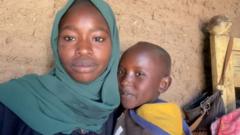While a small group of Afrikaners has accepted President Trump's offer for resettlement in the US, many others express their commitment to South Africa, showcasing the complexity of their identity and the socio-political environment they navigate.
Afrikaners Reflect on Trump’s Refugee Offer Amidst Struggles in South Africa

Afrikaners Reflect on Trump’s Refugee Offer Amidst Struggles in South Africa
A mixed response from Afrikaners about US President Trump's refugee offer sheds light on their deep connection to South Africa amid ongoing challenges.
Johannesburg's social media figure and Afrikaner, Ulrich Janse van Vuuren, has made a name for himself capturing South Africa’s scenic beauty. Proudly dismissing the idea of relocating, he prefers to stay and contribute to the nation he calls home. Following US President Donald Trump’s controversial remarks and support for Afrikaners seeking refuge in the United States, a minor faction of this community has begun to explore this path. The claim that Afrikaners face systemic violence, as propelled by Trump and supporters like Elon Musk, lacks substantial backing, leading many to see those leaving as opportunists rather than refugees.
The socioeconomic landscape in South Africa reveals an ongoing struggle for equity, with higher living standards still prevalent among whites, including Afrikaners. This has fueled a narrative around perceived benefits at the expense of other communities. Mr. Janse van Vuuren argues that the broader crime issue affects all racial groups, with the notion of a targeted campaign against Afrikaners overshadowing real socioeconomic disparities.
The first group of 59 Afrikaners recently departed for the US, leading to mixed feelings across South Africa. President Cyril Ramaphosa condemned their exodus, branding it a "cowardly act" reflective of their unwillingness to adapt to the nation's progress and constitutional changes. Local sentiment aligns with this perspective, emphasizing that the vast majority of Afrikaners are committed to the country’s future.
Yet, some individuals, like Ilse Steenkamp, an Afrikaner farmer, recount personal experiences of losing their homeland to invasions, fueling their desire to seek refuge. Though her situation is seen as extreme, the narrative of oppression she presents contrasts sharply with that of the broader Afrikaner community, which largely rejects victimhood in favor of resilience and progress.
Sam Busà, another Afrikaner eyeing resettlement, argues that emotional trauma from losses is profound enough to necessitate refugee status. Critics, however, highlight that reports do not support claims of systematic persecution against whites in South Africa.
Despite the refugee applications, many organized Afrikaners, including groups like AfriForum, remain in South Africa, seeking to foster change from within. They hold that the exodus does not represent their collective identity, reinforcing a point made by political analyst Dr. Piet Croucamp—that the refugees are a fringe group rather than a wave of displaced individuals.
In conclusion, while Trump’s offer has induced movement for a fraction of South Africa’s white community, the majority of Afrikaners display a steadfast commitment to their homeland, focusing on mutual improvement and a cohesive future.




















